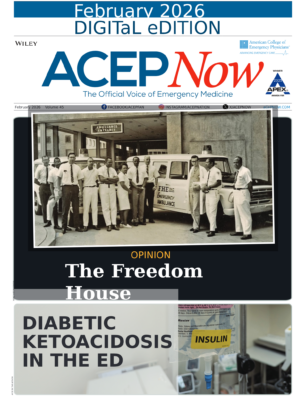
On August 8, 2024, Greg Abbott, Governor of Texas, issued an executive order directing the Texas Health and Human Services Commission “to assess costs to the Texas public hospital system imposed by the federal government’s open-border policies.”1 The order directed hospitals to collect information on patients not lawfully present in the United States beginning November 1, 2024. The initial data submission was due to the Health and Human Services Commission no later than March 1. The data will then be reported to the Governor, the Lieutenant Governor, and the Speaker of the House on January 1, 2026, and annually thereafter.
Explore This Issue
ACEP Now: March 02Data Collection
“The executive order is really just trying to collect data,” explained David Wampler, PhD, LP, FAEMS, San Antonio. He noted that undocumented immigrants have always passed through the area, and the federal Emergency Medical Treatment and Labor Act (EMTALA) compels Centers for Medicare & Medicaid Services (CMS) hospitals to care for all acutely ill or injured patients. However, this is the first time that hospitals have been explicitly directed to gather data on the number of patient discharges, emergency visits, and the cost of care provided to the patients. Dr. Wampler explained that this information is meant to help evaluate the financial burden on hospitals in the state.
Andrea Green, MD, FACEP, Past President of the Texas College of Emergency Physicians (TCEP) and an emergency physician in El Paso, Texas, explains that at registration, patients are given a form that has the patient’s name, but no address or phone number. The form asks if the patient is a citizen or lawfully present in the United States. The patient can answer yes, answer that he or she is unlawfully present, or decline to answer. “I suspect most of the patients we are seeing are lawfully present or citizens,” said Dr. Green. “We rarely get any decline to answer.” She agrees that the process is primarily about data collection.
To the best of Dr. Wampler’s knowledge, the hospitals report data that are not explicitly linkable to any individual patient but rather are surveillance in nature and address five main questions: 1) What is the cost of providing health care services, particularly to uninsured and Medicaid patients? 2) How many individuals are utilizing the public hospital system without corresponding payment? 3) How much reimbursement from Medicaid, the federal government, and other sources are public hospitals receiving compared with the total costs? 4) How much care is provided without reimbursement? 5) What are the overall operational expenditures of public hospitals?
Patient Care
Gov. Abbott stated in his executive order that “federal law contributes to the growth of uncompensated medical costs by requiring that any individual must be allowed to obtain emergency medical treatment regardless of that individual’s immigration status, or willingness or ability to pay for such treatment.” Dr. Wampler pointed out that this is important for emergency physicians because it reinforces that the executive order does not change the federal law requiring access to emergency medical treatment. As further reinforcement of this message, the executive order states that when the information is collected, hospitals should inform the patient that, as federal law requires, any response to the information request will not affect patient care.
“Operationally, it hasn’t affected us that much,” said Dr. Wampler. “Somebody’s status doesn’t really affect the medicine they receive… Emergency medicine has never performed a wallet biopsy. Emergency providers don’t make clinical decisions based on whether or not someone has health insurance.” Dr. Green agrees, explaining there was a little confusion when the question was first introduced, but now there is no pushback from patients responding to the questions.
Dr. Wampler also emphasized the separation between hospitals’ admissions personnel and medical staff. “Health care staff don’t ask those questions,” he said. He does acknowledge, however, that the fact that the questions are being asked may be counterproductive to medical care if it causes people to delay seeking care. He noted that such delays may also affect health outcomes, especially with time-sensitive medical problems, making medical conditions more difficult and expensive to treat.
Merging of Politics with Medicine
“It’s where politics meets medicine,” explained Dr. Wampler. “This is not unusual for Texas.” He noted Chapter 170A of the Texas Health & Safety Code, passed in 2022, which prohibits abortions in nearly all circumstances. Section 170A. prohibits a person from performing, inducing, or attempting an abortion. “The [Texas] abortion ban and access to emergency pain medications are examples of the intersection between medicine and politics,” he says.
Gov. Abbott emphasizes this overlap in his executive order when he specifically identified the Biden-Harris administration as adopting open-border policies that invite mass illegal entry into Texas and other states. In the executive order, Abbott referred to a May 2021 disaster proclamation stating that the surge of individuals unlawfully crossing the Texas-Mexico border posed an ongoing and imminent threat of disaster for Texas.
Gov. Abbott’s assessment of the scope of the immigration problem also appears to be at odds with official data. (Gov. Abbott’s office declined an interview with ACEP Now.) He wrote in the executive order that the number of individuals crossing the southern border had increased to 11 million people entering the country illegally in less than four years. (Factcheck.org places the number closer to 4.2 million.)2 He also stated in the executive order that the Biden-Harris administration had taken steps to prevent states from addressing the crisis by destroying state barrier infrastructure and suing state officials. Moreover, he emphasized that since federal law requires emergency medical treatment, the State of Texas must absorb a large percentage of the cost for individuals not lawfully present in the United States. Texans must bear the costs of public financial support for the medical care of these individuals. Because EMTALA is an unfunded mandate, emergency physicians also bear a portion of this cost. Gov. Abbott further justified the executive order by stating that the increased expenditures for Texas hospitals impose burdens on the Texas health care system and increase the cost of medical care for all Texans.
On October 31, 2024, Tony Pastor, MD, a congenital cardiologist, posted a TikTok video, now viewed 28,100 times, informing the public of their right not to respond to the citizenship question on hospital intake forms.3 Although Gov. Abbott stated this right explicitly in his executive order, on Nov. 24, he posted on X: “Hey Texas Children’s Hospital & Baylor College of Medicine, this doctor is putting your Medicaid & Medicare funding at risk. You better think twice & have crystal clear records. There will be consequences for failing to follow the law in the Order.”4
When asked for an interview on the topic, Texas Children’s in Houston responded: “Texas Children’s continues to prioritize patient care while also ensuring we are in full compliance with all laws and legal directives.”
Texas physicians and hospitals have become familiar with the merging of medicine and politics. While federal law does not protect access to elective abortions, it does protect access to emergency medical care.
David Wampler, PhD, LP, FAEMS, is a professor in the Department of Emergency Health Sciences at UT Health San Antonio. While Dr. Wampler exercises his right to academic freedom, his views are expressed in an individual capacity and do not represent the views of the University of Texas Health Science Center at San Antonio or UT Health San Antonio.
References
- G Abbott. Executive Order GA 46. 2024. Accessed January 14, 2025.
- L Robertson. Breaking down the immigration figures. FactCheck.org. Posted on February 27, 2024. Accessed January 14, 2025.
- T Pastor. DrTonyPastor. TikTok.com. October 31, 2024. Accessed January 14, 2025.
- G Abbott. X. November 24, 2025. Accessed January 14, 2025.
Pages: 1 2 3 | Multi-Page





No Responses to “Texas Hospitals Now Must Ask About Immigration Status”